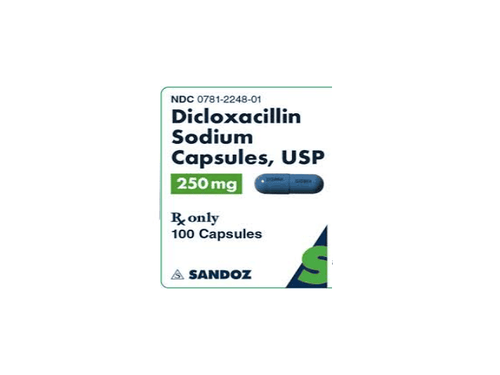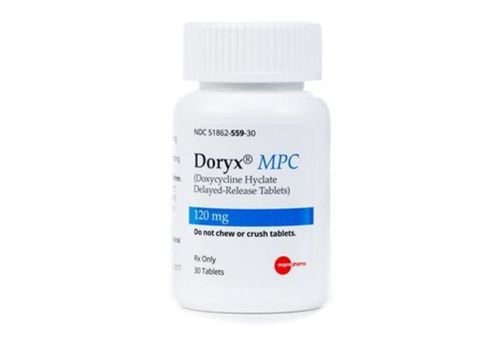This is an automatically translated article.
Ceclor is a drug belonging to the group of antibiotics belonging to the Cephalosporin group. It is used to treat infections caused by bacteria such as otitis media, skin lesions, urinary tract infections, or diseases related to respiratory tract infections.
1. What is Ceclor? The effect of the drug Ceclor
Ceclor belongs to the group of cephalosporin antibiotics that have bactericidal effects due to the ability to inhibit the synthesis of cell walls. Ceclor is effective against the following aerobic, gram-positive and gram-negative bacteria:Staphylococci, including penicillinase-producing, coagulase-positive, coagulase-negative strains (when tested in vitro) , which exhibits cross-resistance between cefaclor and methicillin. Streptococcus pneumoniae; Streptococcus pyogenes; Citrobacter diversus; Escherichia coli; Haemophilus influenzae; Klebsiella spp. Moraxella (Branhamella) catarrhalis Neisseria gonorrhoeae Proteus mirabilis At the same time, Ceclor is also effective against anaerobic bacteria such as:
Bacteroides spp. (except Bacteroides fragilis); Peptococcus niger; Peptostreptococcus spp; Propionibacteria acnes.
2. Indications of the drug Ceclor
Ceclor is indicated in the treatment of infections caused by the following susceptible bacteria:
Otitis media caused by strains of S. pneumoniae, H. influenzae, Staphylococci and M. catarrhalis. Lower respiratory tract infections, including pneumonia, are caused by bacteria such as S. pneumoniae, H. influenzae. Inflammation of the upper respiratory tract, including pharyngitis and tonsillitis. Urinary tract infections including pyelonephritis and cystitis caused by E. coli, Klebsiella spp, P. mirabilis and coagulase negative staphylococci. Note: Cefaclor is effective in the treatment of urinary tract infections, both acute and chronic. Skin and skin structure infections caused by S. aureus and S. pyogenes. Sinusitis disease. Urethritis caused by gonorrhea.
3. How to make Ceclor 125mg
Ceclor is made in the form of granules mixed with oral suspension, so your doctor will prescribe you to use it orally. You can use it in the following ways:
You mix the nuggets with water to create a drinking suspension. After reconstitution, 5mL of suspension contains cefaclor monohydrate equivalent to 125mg or 250mg of Ceclor. Note: You need to follow the instructions on the dose and use of Ceclor as prescribed by the treating doctor or the information on the drug instruction sheet.
4. How to use and dose of Ceclor
4.1. How to use Ceclor To ensure proper use of Ceclor, you need to pay attention to a number of issues as follows:
Strictly follow the instructions of the treating doctor about the dose and duration of use. Never increase or decrease the dose on your own without consulting your doctor. Ceclor should only be used orally. Ceclor is available in the form of capsules and oral suspension that can be taken with or without food. Extended-release tablets should be taken with a meal or within 1 hour of a meal to increase absorption. If after using the prescribed dose and time, your condition still does not get better or worsens, please stop using the medicine and consult your doctor for advice on effective treatment. more fruitful. 4.2. Dosage of Ceclor drug Depending on the subject, medical condition and related medical conditions, the doctor will prescribe the appropriate dose and duration of taking the drug. Normally, Ceclor drug will be used with the following dosage:
For adults
Take Ceclor 250 mg / 8 hours / time. In severe cases, you need to increase the dose to double and up to 4 g/day. Pharyngitis, tonsillitis, bronchitis, skin and soft tissue infections, and urinary tract infections are uncomplicated. Take Ceclor 250 mg / 8 hours / time. If the infection is more severe or the isolates are less susceptible, 500 mg every 8 hours can be used. Ceclor extended-release tablet form 375mg / 12 hours / time x 10 days. Lower respiratory tract infections: Take Ceclor 250 mg every 8 hours. If the disease is more severe, such as pneumonia or less sensitive isolates, 500 mg / 8 hours can be used. Ceclor extended-release tablets for the treatment of flare-ups of chronic bronchitis or acute bronchitis with superinfection are 500 mg every 12 hours for 7 to 10 days. Note: This is a reference dose, depending on different subjects (elderly, young, liver failure, kidney failure, pregnant women, lactating women) will have different treatment indications. Therefore, you need to adhere to the exact dose prescribed by the treating doctor.
4.3. In case of overdose of Ceclor drugs Signs of poisoning when using Ceclor drugs may include:
Signs of digestive disorders such as nausea, vomiting, diarrhea; Pain in the epigastrium. The severity of epigastric pain and diarrhea depends on the dose used. If you develop additional signs and symptoms, it may be a secondary reaction to an underlying disease, or an allergic reaction or the effects of other poisonings.
As soon as you or a loved one detects signs of an overdose of Ceclor, the thing to do is to contact and immediately go to the nearest medical facility for early treatment.
4.4. If you miss a dose You need to take it again as soon as you remember the missed dose. If it is almost time for the missed dose, skip the missed dose and take it as scheduled. Absolutely do not use the drug at a dose twice the prescribed dose for the purpose of making up for the drug.
5. Undesirable effects of the drug Ceclor
The drug Ceclor can cause a lot of unwanted side effects for users. Health problems that you may experience include:
Burning pain in the epigastrium; Nausea and vomiting; Diarrhea; Jaundice and yellow eyes; Dark urine ; The body easily bruises and bleeds; Manifestations of infection such as pain, fever; Mood and mental changes. Although very rare, there is a risk of serious intestinal problems when taking Ceclor, because some bacteria that are resistant to the drug work to harm the gut. This can happen even during treatment or a few weeks or even months after stopping the drug. If you encounter this situation, you must not arbitrarily use any more medicine to treat it, but you should immediately notify the treating doctor. Symptoms of intestinal problems can be as follows:
Diarrhea for a long time. Cramps, muscle aches. There is mucus or blood in the stool. With cases of using Ceclor for a long time or repeated use, you may have fungal infections in the mouth and vaginal area. You need to pay attention to observe and notify the treating doctor if white patches appear in the mouth or vaginal discharge changes.
In addition to the abnormal signs mentioned above, you need to contact the medical center for immediate treatment if you see the body showing signs of allergic reactions as follows:
Itching, rash; Swelling of the mouth, tongue, and throat; Unusual joint pain; Shortness of breath . The above is a non-exhaustive list of Ceclor side effects, depending on the subject you may experience many other health problems. You need to talk to your doctor about any unusual signs in your body while using Ceclor.
6. Interactions of Ceclor
Concomitant use of Ceclor and Warfarin rarely causes an increase in prothrombin time and dose adjustment if necessary. Probenecid increases serum concentrations of Ceclor. Concomitant use of Ceclor with aminoglycoside antibiotics or furosemide diuretics increases nephrotoxicity.
7. Some notes when using Ceclor
Be careful with people who have a history or are sensitive to Ceclor. Long-term antibiotic use can cause C. difficile pseudomembranous colitis. In patients with severely impaired renal function, the dose should be reduced. However, for patients with moderate renal impairment, no dose adjustment is required. The safety and effectiveness of Ceclor capsules and oral suspension for infants less than 1 month of age have not been established. For people who have ever had gastrointestinal diseases, especially colitis. Use with caution and be aware of the risk of pseudomembranous colitis. For pregnant women, the drug is considered safe to use in pregnant women. However, because there is not enough research to prove the safety of Ceclor, you should only use it when your doctor has carefully weighed the benefits and risks before deciding to use Ceclor. use. For nursing women: The concentration of Ceclor in breast milk is very low. However, there is still not enough evidence about the effects of the drug on nursing infants, so you need to pay close attention and be cautious when you see the baby has diarrhea, thrush and rash. Therefore, while the mother is taking Ceclor, consideration should be given to stopping breastfeeding. Ceclor is used to treat infections caused by bacteria such as otitis media, skin lesions, urinary tract infections or diseases related to respiratory infections. To ensure the effectiveness of treatment and avoid unwanted side effects, patients need to take the drug according to the prescription or strictly follow the instructions of the doctor or pharmacist.
Follow Vinmec International General Hospital website to get more health, nutrition and beauty information to protect the health of yourself and your loved ones in your family.
Please dial HOTLINE for more information or register for an appointment HERE. Download MyVinmec app to make appointments faster and to manage your bookings easily.













